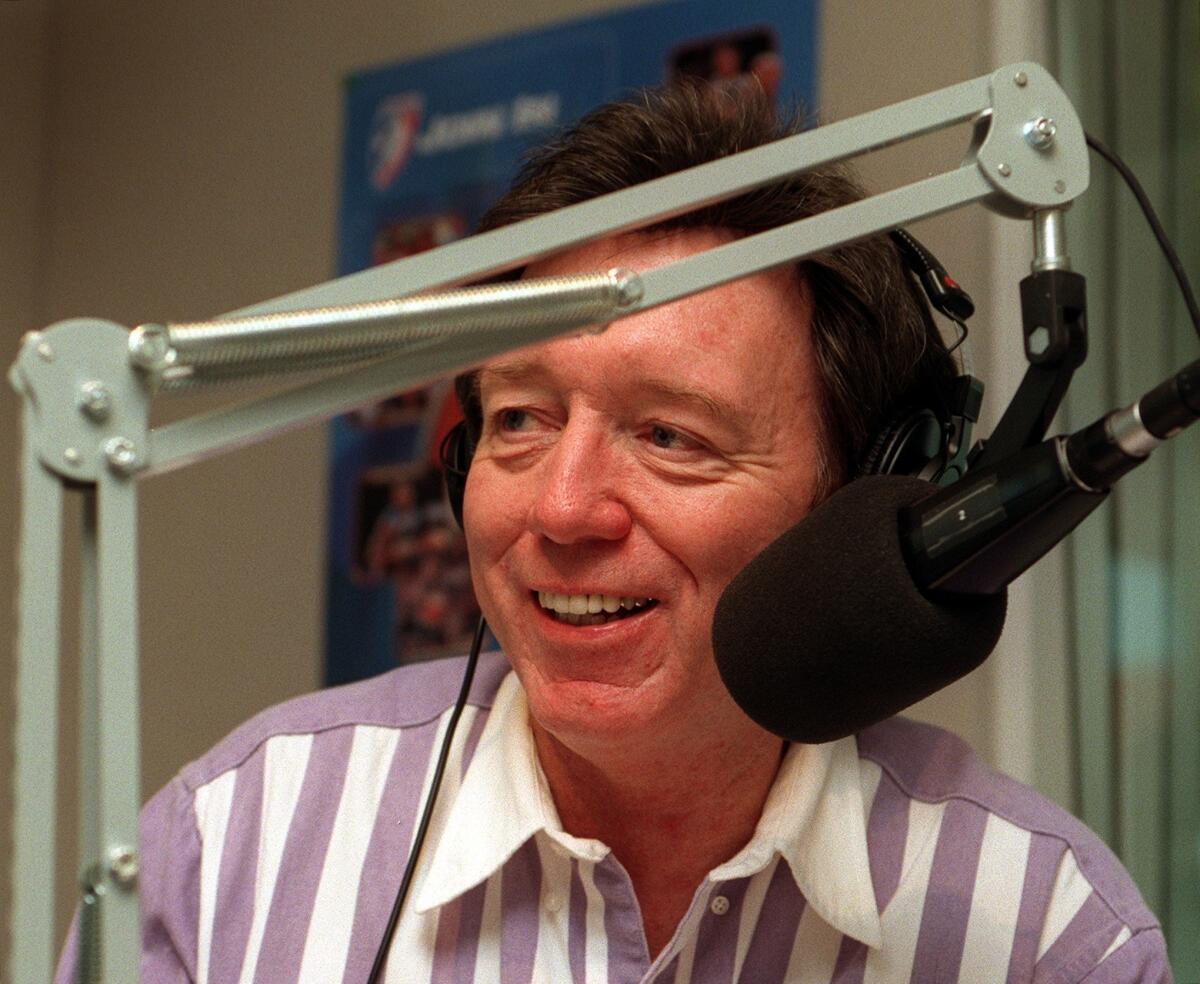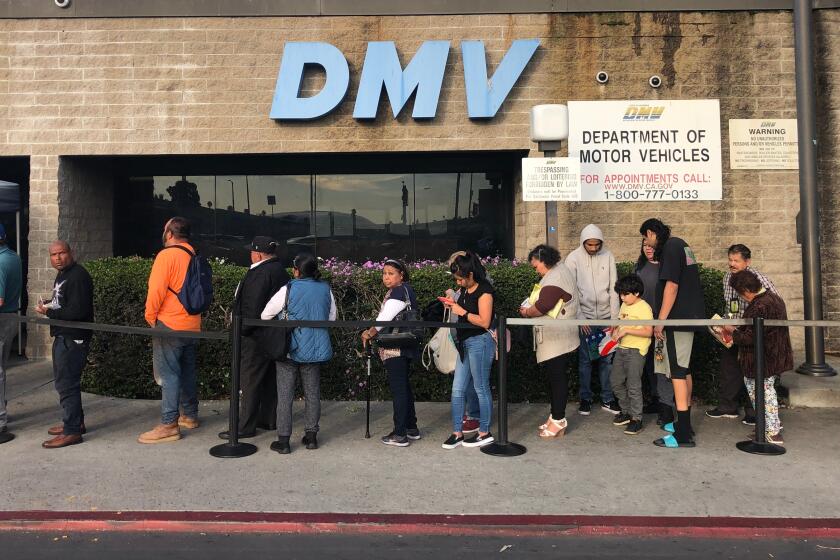Charlie Tuna dies at 71; Los Angeles radio legend

Charlie Tuna, whose distinctive voice graced numerous Los Angeles radio stations for four decades, died this month at age 71.
- Share via
Longtime Los Angeles radio disc jockey Charlie Tuna, who not only hosted the morning radio show for popular and influential station KHJ-AM in the late 1960s but also went on to be a key player in the launch of latter-day powerhouses KROQ-AM and KIIS-FM, has died. He was 71.
Tuna, whose real name was Art Ferguson, “passed away peacefully in his sleep” at his home in Tarzana on Feb. 19 after a sudden illness, family spokeswoman Michele Durant told The Times on Monday.
Ferguson, who was born April 18, 1944, in Kearney, Neb., took over the name he used on the radio for nearly 50 years from a fellow disc jockey when both were on the air in Oklahoma City in 1966. Before that, he had used the on-air name Bill O’Day.
His crystalline baritone introduced musicians and hit records to radio listeners across Southern California for nearly half a century.
In his heyday, Tuna was one of KHJ’s “Boss Radio” personalities — known as “Boss Jocks” — a team that also included Robert W. Morgan, the Real Don Steele, Sam Riddle, Humble Harve, Bobby Tripp and Johnny Mitchell.
They helped the station rise from abysmal ratings to take on reigning heavyweight rock station KRLA-AM (1110) by introducing the Boss Radio format, which emphasized more music, a tighter playlist and less deejay chatter. It became a blueprint for Top 40 radio stations around the country.
In May of 1965, KHJ’s audience share rating was 2.2, while KRLA scored a massive 21.8, according to Ron Jacobs, who worked with pop radio pioneers Bill Drake and Gene Chenault in establishing the Boss Radio format at KHJ.
See the most-read stories this hour >>
“We must have the same attitude as any winning ball club: Brand new day, brand new game,” Jacobs told his staff in 1966. “The Dodgers don’t get any points this year for last year’s wins. And the fact that they’re champs won’t stop any base hits by the opposition unless L.A. plays like champs.”
Stations such as KHJ and KRLA played vital roles in the genesis of countless hit records, especially for groups based in the Southland.
“Bands would cut a record on Tuesday, and Wednesday they’d give us a tape,” Tuna told The Times in 1993. At that time he recalled getting a call in 1966 from Beach Boys creative leader Brian Wilson asking whether the station might be interested in playing his group’s latest record, “Good Vibrations.”
Tuna also was involved in a key moment in pop radio history in 1968 when KHJ, then heavily focused on three-minute singles as were most pop radio stations, decided to take a gamble on actor-singer Richard Harris’ recording of songwriter Jimmy Webb’s epic “MacArthur Park,” which ran more than seven minutes.
It was getting airplay on then-new underground FM stations, which increasingly were drawing listeners away from pop stations as the boundaries of rock music, and the lengths of songs, were expanding.
“We were paying attention to what they were playing,” Tuna told The Times in 2013. “We didn’t want to lose that hip crowd.”
Once KHJ played the record, Tuna said, other stations followed suit, a statement that Webb confirmed.
It became a national hit and helped throw open the door to AM radio playing longer tracks such as the Beatles’ “Hey Jude” and Simon & Garfunkel’s “The Boxer” and “Bridge Over Troubled Water.”
Radio personalities also served as a vital connection to music for fans. An audience of teens attending a youth event at the Hollywood Palladium was asked to rank the biggest influences in their lives. “The order,” deejay Morgan recalled in 1993, “was God, disc jockeys, then parents.”
Tuna received a star on Hollywood’s Walk of Fame in 1990 and was inducted into the Nebraska Broadcasters Assn. Hall of Fame in 1997. In various surveys of radio listeners and his radio industry peers Tuna landed several times on rankings of the Top 10 L.A. radio personalities.
After five years at KHJ, Tuna was recruited in 1972 for a new Top 40 AM station when country station KBBQ changed its format and call letters to KROQ-AM. It eventually expanded with an FM counterpart that revolutionized FM radio. The following year he moved to pop station KKDJ-FM (102.7) as program director and morning show host, then oversaw that station’s transformation into KIIS-FM, which became one of the most influential and most imitated pop radio stations in the nation.
Other stations for which Tuna hosted shows over the succeeding decades included KBIG-FM, KTNQ, KHTZ, KRLA, KODJ, KMPC, KIKF and KLAC, at various times working in pop, rock, oldies, country, talk and sports formats. He may have spent more time as a morning radio personality for more stations and formats than anyone in Los Angeles radio history.
In 2008 Tuna joined oldies station KRTH-FM (101.1), hosting a weekly show while also syndicating radio shows through his CharlieTunaSyndication.com website. He also hosted a daily show for Armed Forces Radio Network from 1971 to 1996, logging more than 6,000 programs.
Tuna also appeared frequently over the years on various TV programs, serving as the announcer for the game show “Scrabble” and host of the international edition of “Inside Hollywood.”
In addition to his career in radio, he was an active supporter of the Children’s Hospital Los Angeles and hosted an annual “Tunathon” fundraiser that generated $2.5 million for the facility.
He is survived by his wife, two daughters and two sons.
Twitter: @RandyLewis2
------------
For the Record
March 1, 9 a.m.: An earlier version of this article stated that Charlie Tuna hosted the “Scrabble” TV game show. He was the announcer.
------------
ALSO
City National’s Bram Goldsmith dies at 93
Former Disneyland president Jack Lindquist dies
George Kennedy dies at 91; Oscar-winning ‘Cool Hand Luke,’ ‘Airport’ actor
More to Read
Sign up for Essential California
The most important California stories and recommendations in your inbox every morning.
You may occasionally receive promotional content from the Los Angeles Times.











